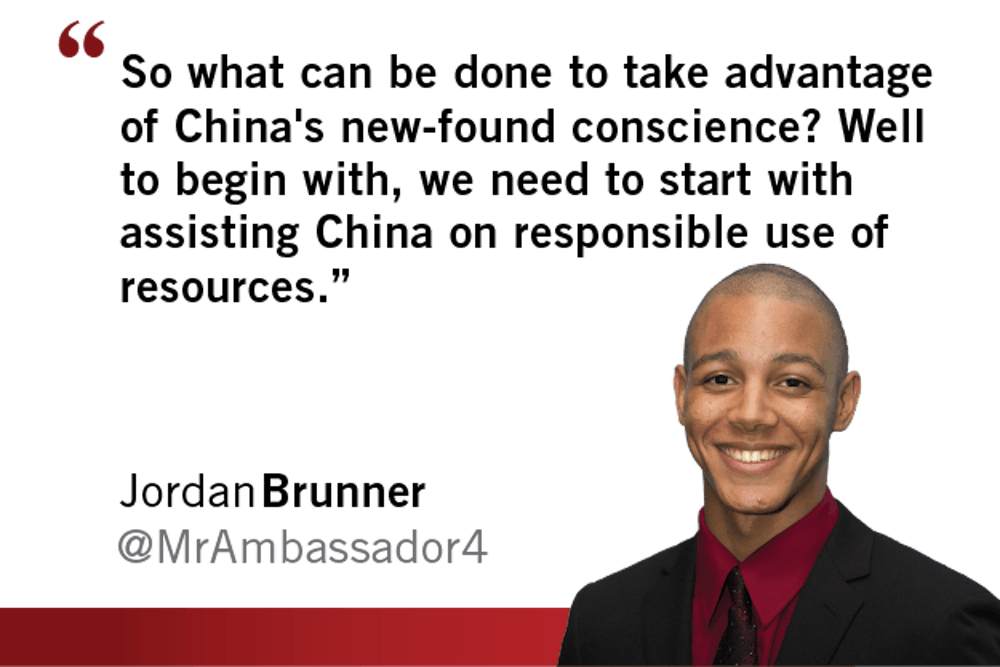China rarely helps America out. In fact, other than holding 8 percent of our debt, China wants little to do with us. So I’m sure it was a big shock for many in the U.S. when Chinese officials came out at the U.N. conference saying that they were going to help President Obama on climate change by releasing a goal and a timeline for substantially cutting carbon emissions “as soon as we can.”
Why is China so willing to cut emissions now, when just a few years ago, it was allied with India in trying to stymie climate talks? Well now the problem has started to hit closer to home: the “apocalyptic” pollution that Chinese citizens experience on a daily basis has become a big issue. The cause of much of the pollution – China’s crippling dependence on coal – is affecting not only its economic power abroad, but also productivity at home, as its people become sicker.
Perhaps the most worrying problem was highlighted by the Global Carbon Project. According to its report, China has passed the entire European Union in how much carbon it is emitting. This means that one country, due to industrialization and a lack of effective government regulation, is emitting more than 28 countries combined. In fact, China makes up for about 23 percent of all emissions around the globe – that’s more than any other country, even the U.S. That’s why the U.N. needs to act quickly on China’s new change of heart.
So what can be done to take advantage of China's new-found conscience? Well to begin, we need to start with assisting China on responsible use of resources. For instance, the U.S. can partner with other countries on the Security Council to create economic and information incentives for the Chinese to cut emissions faster. After all, it is up to the domestic audiences of any government to actually make the changes that are needed, so the business and political leaders of China will be the most influential players in trying to handle this problem.
By removing trade barriers, advising the Chinese on how to better regulate emissions and sharing innovative climate technology, the U.S would not only be helping to solve the climate change problem, but would also be building trust with China that would be invaluable in the future. It might even help open China up on many issues where it has opposed us in the past.
Congress should use its authority as well, by sending some of its members over to China to work closely with their counterparts in the Chinese government. After all, Congress travels to foreign countries quite frequently. However, this might not happen. Although President Obama knows it is only common sense to work with the Chinese due to the urgent threat that our combined emissions poses to the globe, the politicians on Capitol Hill do not often share his same foresight. “China-bashing” is popular, and so is “Obama-bashing,” especially in an election year — this year will most likely be no different.
So even as the globe continues to heat up, there has been little — if any — effort by Republicans to support the President on helping China. Of course, Republicans may be yawning, because they have been conditioned to be pessimistic about any U.N. efforts. After all, every U.N. initiative before now has either failed to have any effect on the climate change or has only gone halfway.
In the end, the U.S. Congress will be judged by how much it contributes to the effort to handle climate change. Whether it wants to be seen as a solution or a stumbling block is up to those politicians currently in power. That goes for the rest of the world as well. The respective nations composing the U.N. may have to make some domestically unpopular decisions. They may even have to rearrange the trans-national landscape in order to solve this problem, for which Europe provides the model. But one thing is clear: If we are to save the globe, something new, something operational, needs to happen. And it needs to happen before we run out of time.
Reach the columnist at jbrunne2@asu.edu or follow him on Twitter @MrAmbassador4
Editor’s note: The opinions presented in this column are the author’s and do not imply any endorsement from The State Press or its editors.
Want to join the conversation? Send an email to opiniondesk.statepress@gmail.com. Keep letters under 300 words and be sure to include your university affiliation. Anonymity will not be granted.
Like The State Press on Facebook and follow @statepress on Twitter.





